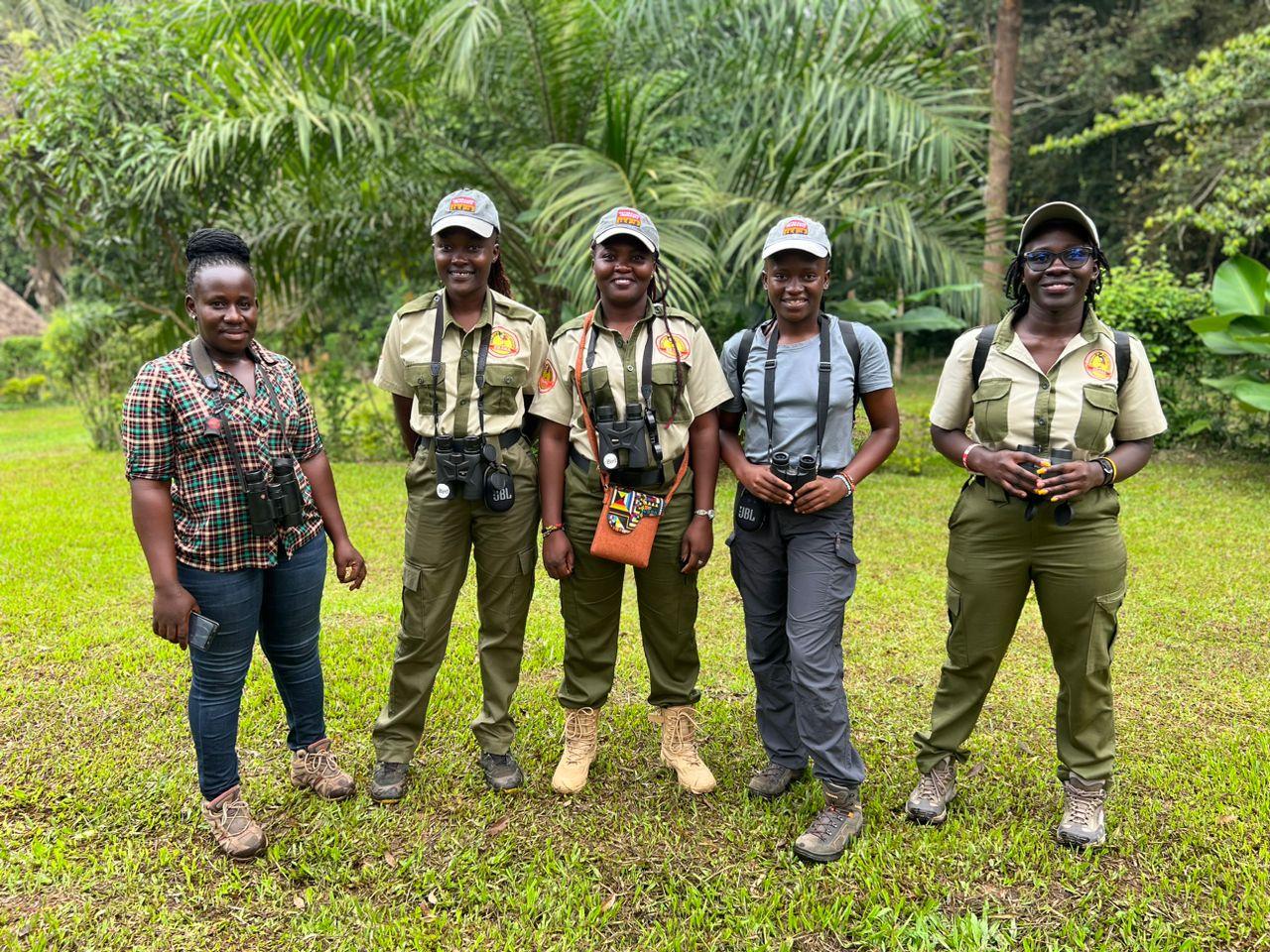On a recent Sunday morning, a group of eight women birders met in the historic botanical garden in Entebbe, a town nestled along the shore of Lake Victoria.
More than 400 bird species can be found in the garden. The women oohed and aahed as they spotted some of their favorites, including a broad-billed roller perched high in a cluster of trees and the rare sight of a female great blue turaco feeding one of her chicks.
“Birds are everywhere. You can miss a lion, but you can’t miss a bird!”
“I love birds!” said Priscilla Kabarungi, one of the tour leaders. “Birds are everywhere. You can miss a lion, but you can’t miss a bird!”

Most of the women in the group are training to become professional bird guides with Uganda Women Birders.
Kabarungi joined the group last year and has already learned to identify more than 200 species. She also enjoys leading safaris, but said she really loves turning people on to the beauty of birds, especially people who aren’t that interested at first.
“By the time you finished talking to this person, this person will have got that love for birds, because of the colors, the calls,” she said.
Machline Komujuni said birds bring back memories of her childhood in rural Uganda. Her mother taught her that birds use their calls to communicate with each other, sending messages when there’s danger or the seasons are about to change. She said her mother was illiterate, but used Indigenous knowledge to understand the birds’ messages.

Komujuni said she adores parrots for their ability to mimic people. She discovered bird watching while studying hospitality at university and immediately decided to make a career of it. She said her ambition is to give clients the best birding experience possible.
“I just want to be the best bird guide. I just want to identify every bird I come across, especially in my country.”
“I just want to be the best bird guide. I just want to identify every bird I come across, especially in my country,” she said.
Komujuni already works for a travel company, but her salary as a booking agent is a fraction of what she could earn as a professional bird guide. Until recently, she struggled to find the money for training and basic equipment like binoculars and guide books. And as the mother of a 2-year-old, she said it’s been a challenge to find the time to develop her skills.
For most Ugandan women, household responsibilities come first, and that can conflict with the demands of early morning birding trips and two- or three-week-long birding tours.
“A man can wake up and move for birding without looking at the children,” she said. “But to a woman, if you ever wake up and just leave kids without having breakfast, leave kids without making sure they are all OK, you have committed a crime.”

Ironically, it was a man who founded the Uganda Women Birders in 2013. Herbert Byaruhanga said men had dominated the tourism business for “a very long time.”
Byaruhanga is one of Uganda’s most distinguished guides, known for taking young apprentices under his wing. But he said he hadn’t thought of including women until a birdwatching trip in Illinois, led by a female guide.
“She was 65 years old, and she was able to whistle out birds. And I was like, wow, if she can do this at 65, what about our girls in Uganda?” he said.

In many parts of Uganda, whistling is reserved for men – one of the cultural taboos that has kept women out of the industry.
Uganda Women Birders tackles those taboos by giving women the experience and resources they need to prove they can do the job. The club currently has more than 100 members. About 30 women earn a living as bird guides.
Wendi Haugh, a cultural anthropologist at St. Lawrence University in upstate New York, said the club has had a global impact.
“What’s surprising is how few women guides there are in countries where you wouldn’t think this would be an issue,” she said.
Haugh is writing a book about the working lives of professional bird guides. She said that even in countries like the United States, women bird guides still battle stereotypes.
“How capable are you really of doing this? Do you really know your stuff? Can you actually drive this vehicle? You know, they’re up against that without the support the Uganda women guides have,” she said.
Haugh said Uganda’s women guides are known around the world and some countries have started their own clubs. Some travel agencies are also training women or asking specifically for female guides.
Kabarungi said the opportunity to learn from her fellow women birders has given her the courage to challenge stereotypes. She has learned to drive a safari van and apprenticed as a mechanic, typically considered as masculine skills in Uganda.
To become a professional birder, she said, “you have to first put the woman in you aside and try to be a man somewhere in those skills.”
Machline Komujuni said the club uncovered a dream she never knew she had. She still can’t afford binoculars but she’s confident that someday she will.
“My dream is not yet fulfilled fully as I want, but at least I’m in the line of fulfilling it and I will make it.” she said. “I’m trusting myself that I will make it.”
The article you just read is free because dedicated readers and listeners like you chose to support our nonprofit newsroom. Our team works tirelessly to ensure you hear the latest in international, human-centered reporting every weekday. But our work would not be possible without you. We need your help.
Make a gift today to help us raise $67,000 by the end of the year and keep The World going strong. Every gift will get us one step closer to our goal!
